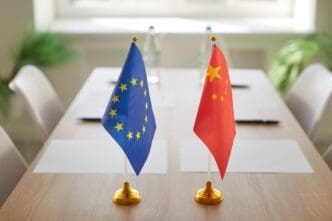Executive Summary
- European Union and Chinese officials are set to convene next week in Brussels for an ‘Export Control Dialogue’ to address escalating trade tensions, primarily focusing on China’s expanded controls on rare earth exports.
- China’s export controls on 12 of 17 rare earth elements, coupled with its processing of approximately 90% of the world’s rare earths, are causing global shortages and posing a significant threat to vital EU manufacturing sectors.
- The trade dialogue also encompasses other friction points, including EU tariffs on Chinese electric vehicles and the Netherlands’ seizure of Chinese-owned chipmaker Nexperia, all within the broader context of geopolitical rivalry between Washington and Beijing.
The Story So Far
- China’s dominant position in processing approximately 90% of the world’s rare earths, which are critical for high-tech industries like automotive and aerospace, gives it significant leverage over global supply chains. Recent Chinese export controls on these materials have created worldwide shortages, directly threatening vital EU manufacturing sectors and escalating existing trade tensions between the EU and China, which are also influenced by broader geopolitical rivalries.
Why This Matters
- The escalating trade tensions, particularly China’s expanded controls on rare earth exports, pose a significant threat to vital EU manufacturing sectors like the automotive industry, which rely heavily on these critical materials, potentially leading to supply chain disruptions and increased costs. This situation highlights China’s substantial leverage over global supply chains due to its dominance in rare earth processing, further complicating the broader geopolitical and trade relationship between the EU and Beijing.
Who Thinks What?
- European Union officials are concerned about China’s expanded rare earth export controls, which threaten vital EU manufacturing sectors, and seek to address these restrictions and improve the processing of export license applications.
- China has implemented export controls on rare earths, asserting its dominance in processing these critical materials, while also raising grievances regarding EU tariffs on Chinese electric vehicles and the seizure of Nexperia.
European Union and Chinese officials are set to convene in Brussels next week to address escalating trade tensions, with a primary focus on China’s expanded controls on rare earth exports. These restrictions pose a significant threat to vital EU manufacturing sectors, including the automotive industry, which heavily rely on these critical materials.
The upcoming in-person and virtual meetings, operating under the ‘Export Control Dialogue’, were agreed upon during a two-hour video call earlier this week between European Trade Commissioner Maros Sefcovic and Chinese Commerce Minister Wang Wentao. Neither Sefcovic nor Wang are scheduled to attend the direct discussions.
Trade Friction Points
Beyond rare earths, the recent dialogue between Sefcovic and Wang touched upon a range of issues contributing to trade friction. These include EU tariffs on Chinese electric vehicles and the Netherlands’ seizure of Nexperia, a computer chipmaker with Chinese ownership.
China’s export controls on rare earths, which affect 12 of the 17 elements, are particularly contentious. These materials are indispensable for a wide array of high-tech products, from electric vehicles and aircraft engines to advanced military radar systems.
China’s Dominance and Global Impact
China currently processes approximately 90% of the world’s rare earths and rare earth magnets, giving it substantial leverage over global supply chains. Export controls implemented since April have already led to worldwide shortages, though subsequent agreements with Europe and the United States have offered some relief.
Despite these efforts, the European Commission reports that only just over half of the 2,000 priority export license applications from EU companies have been properly processed. This backlog highlights ongoing challenges for European manufacturers.
Geopolitical Context
While China has its own grievances with the European Union, the bloc finds itself partly enmeshed in the broader geopolitical rivalry between Washington and Beijing. The upcoming talks represent an effort to navigate these complex dynamics and stabilize crucial trade relationships.








